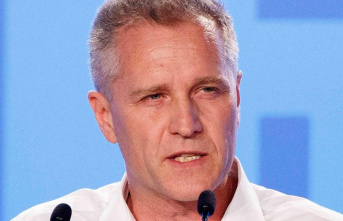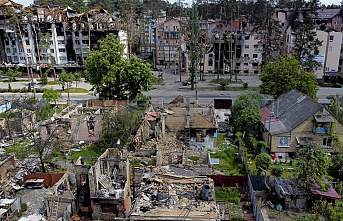China's foreign minister arrived Friday in Kiribati, a remote Pacific nation where the future is at stake.
Wang Yi's planned visit of four hours was his second stop on an 8-nation tour. This comes amid growing concern about Beijing's financial and military ambitions in the South Pacific.
Kiribati has closed its borders for this year to try and stop the spread of COVID-19. Its government granted Wang and his 20-strong delegation entry to the country, making it a rare exception.
The future of the Phoenix Islands Protected Area (a stretch of ocean roughly the same size as California) is at stake in Kiribati. It has been designated a UNESCO World Heritage Site.
Taneti Maamau, Kiribati's President, announced in November that the government would lift the ban on commercial fishing which had been in effect since 2015 and allow the region to be sustainably fished.
Anna Powles is a senior lecturer in security at Massey University New Zealand. She said that she believed there would be some fisheries deals between China and Kiribati resulting from Wang's visit.
Powles stated that China, already the dominant country in fishing, offered to improve an airport runway and causeway on the Phoenix Island group.
She said, "The concern is that it would essentially wipe out the fish stock." It would cause severe damage to fish stocks already under stress.
She expressed concern that any base for Chinese commercial fishing vessels in Kiribati could be used to support Beijing's surveillance operations.
The president of Kiribati stated that Wang would visit his residence to have bilateral discussions. He also stressed the existing health protocols.
Maamau stated in a statement, that the Chinese delegation would have to undergo PCR tests prior to arriving in Kiribati and would then need to stay in a travel bubble for a week. He also said that everyone in Kiribati who comes into contact with them will need to be quarantined for a week afterward -- presumably including himself.
Maamau stated that the high-level visit to China is an important milestone in Kiribati-China relations. It will promote and strengthen partnership and cooperation between our countries following the 2019 resumption diplomatic ties.
China claims Wang's visit to the region is a continuation of long-standing friendly relations between Beijing, Taiwan and the island nations.
The Associated Press has obtained a draft document that shows Wang hopes to make a deal during his visit with 10 small Pacific countries. This comprehensive agreement covers security and fisheries, and at least one Pacific leader believes it is an attempt to take control of the region.
Wang hopes that the countries will agree to the agreement after the May 30 meeting in Fiji between the foreign ministers.
Australia responded quickly by sending Penny Wong, its Foreign Minister to Fiji to support the Pacific.
She said, "This would essentially wipe out the fish stock." It would cause severe damage to fish stocks already under stress.
She expressed concern that any base for Chinese commercial fishing vessels in Kiribati could be used to support Beijing's surveillance operations.
The president of Kiribati stated that Wang would visit his residence to have bilateral discussions. He also stressed the existing health protocols.
Maamau stated in a statement, that the Chinese delegation would have to undergo PCR tests prior to arriving in Kiribati and would then need to stay in a travel bubble for a week. He also said that everyone in Kiribati who comes into contact with them will need to be quarantined for a week afterward -- presumably including himself.
Maamau stated that the high-level visit to China is an important milestone in Kiribati-China relations. It will promote and strengthen partnership and cooperation between the two countries following the 2019 resumption diplomatic ties.
China claims Wang's visit to the region is a continuation of long-standing friendly relations between Beijing, Taiwan and the island nations.
The Associated Press has obtained a draft document that shows Wang hopes to make a deal during his visit with 10 small Pacific countries. This comprehensive agreement covers security and fisheries, and at least one Pacific leader believes it is an attempt to take control of the region.
Wang hopes that the countries will agree to the agreement after the May 30 meeting in Fiji between the foreign ministers.
Australia responded quickly by sending Penny Wong, its Foreign Minister to Fiji to support the Pacific.
ADVERTISEMENT
Wong stated that Fiji was the country to decide which partnerships and agreements it formed, but encouraged them to think about the advantages of staying with Australia.
Wong stated that Australia will not be a partner with strings attached or impose unsustainable financial burdens. "We will not undermine the Pacific priorities or Pacific institutions," Wong said.
China and the Solomon Islands signed a security agreement last month, a shocking move that shocked the entire world.
There are fears that China might send troops to the Solomon Islands or establish a military base in the area, which is not far from Australia. China and the Solomon Islands both deny any plans to establish a base.
Wang will also make stops in Samoa and Fiji, Vanuatu (Papua New Guinea), East Timor, Tonga, Fiji, Vanuatu, Samoa and Tonga during his 10-day trip.
Anthony Albanese, Australia's new Prime Minster, said that he had sent Wong to Fiji on Thursday because Australia needed to "step-up" its efforts in the Pacific.
He told the Australian Broadcasting Corp that China is seeking to increase its power in a region where Australia has been the preferred security partner since the Second World War. "We must respond to this."
Wang Wenbin, spokesperson for the Chinese Foreign Ministry, said that cooperation and exchanges between Beijing and island nations have been growing in recent years. This development was welcomed by Pacific countries.












